NGO Registration in India: Things to Consider

Shivani Jain | Updated: Oct 09, 2020 | Category: NGO
The term “NGO Registration in India” denotes the process in which a voluntary union or group of people decides to start an organisation, which will work for the charitable and non-profit making purpose.
Further, it shall be relevant to note that an NGO cannot payout dividends and benefits to its members and individuals. Also, starting an NGO in India requires skill, resources, knowledge, and assistance from various volunteers, government agencies, and legal advisors.
In this blog, we will discuss the things to consider before NGO registration in India, together with the documents and Laws applicable.
Table of Contents
Concept of Non Governmental Organisation
The term Non Governmental Organisation denotes an organisation or an entity that work for the welfare of public or animal. Further, as per a definition coined by the United Nations, any organisation that pursues activities given below can be termed as an NGO:
- Relieves the suffering of the weaker section;
- Promotes the interest of the poor people;
- Provides basic social amenities; and
- Undertake communal development;
However, it shall be relevant to note that an NGO can be either a non-governmental, quasi, semi, voluntary or non-voluntary in nature.
Agendas of an NGO Registration
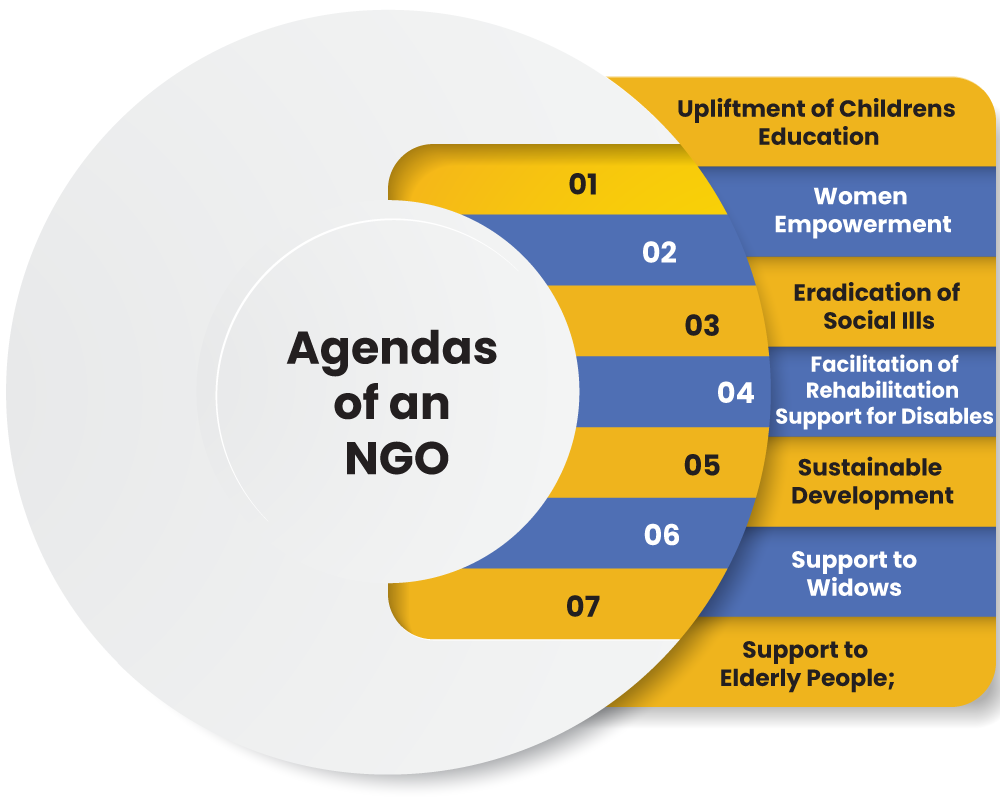
The agendas of an NGO are as follows:
- Upliftment of Childrens Education;
- Women Empowerment;
- Eradication of Social Ills;
- Facilitation of Rehabilitation Support for Disables;
- Sustainable Development;
- Support to Widows;
- Support to Elderly People, etc.;
Laws Regulating NGO Registration in India
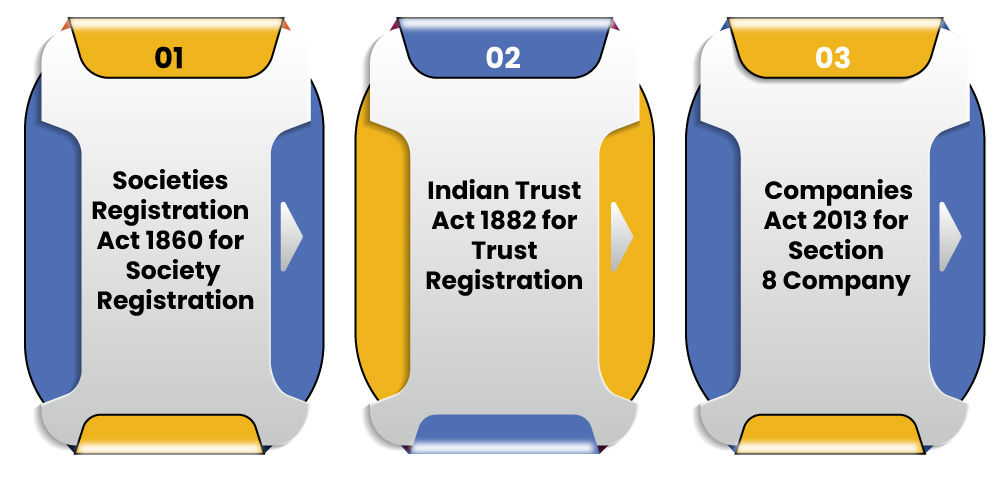
The laws regulating NGO Registration in India are as follows:
- Society Registration Act 1860 [1] for Society Registration;
- Indian Trust Act 1882 for Trust Registration;
- Companies Act 2013 for Section 8 Company;
Benefits of NGO Registration in India
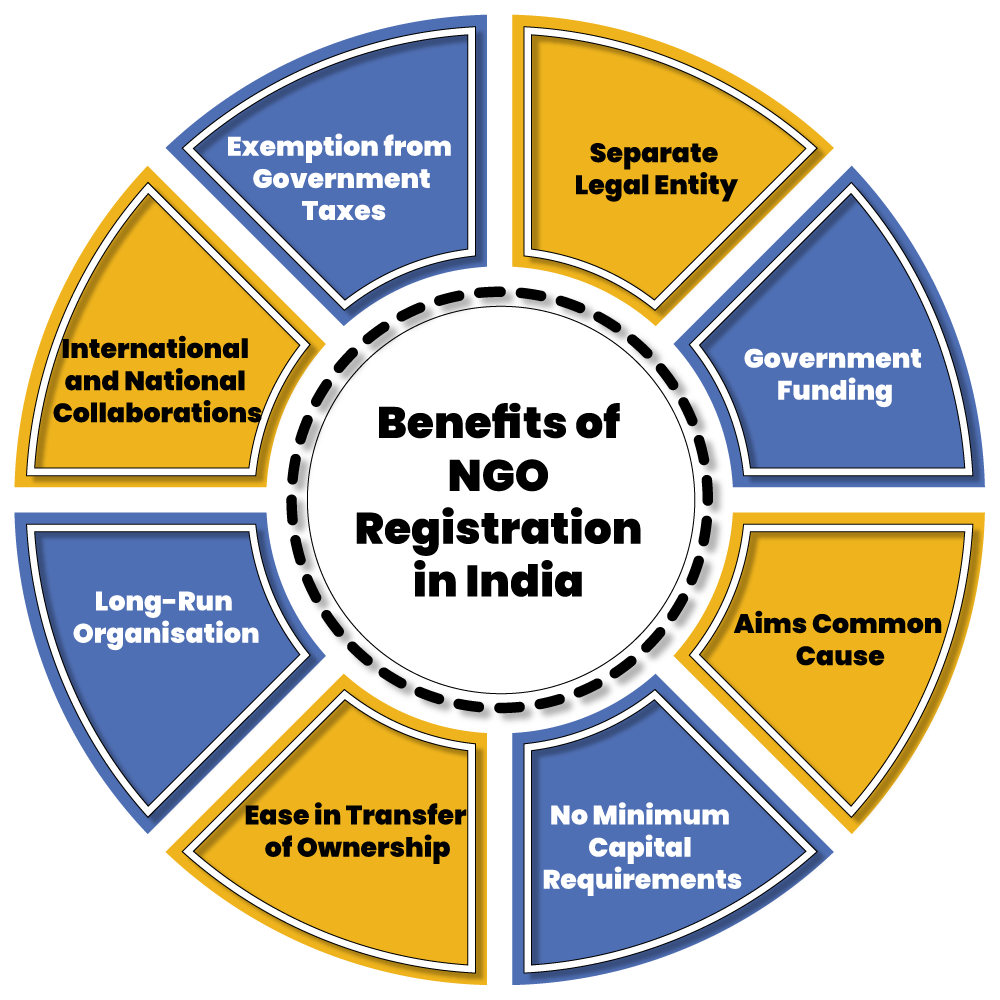
The benefits of the NGO Registration in India are as follows:
Exemption from Government Taxes
An NGO that is registered under the Societies Registration Act 1860 does not require to pay any Income Tax, as it works for the Welfare of the Society.
Separate Legal Entity
A registered NGO enjoys the status of a separate legal entity like any other public and private business firms.
Government Funding
Once an NGO gets registered under the Societies Registration Act 1860, it will get financial assistance from both the government and various private agencies. The reason for the deposit of funding is to work for the betterment and welfare of the needy section of the society.
However, it shall be relevant to note that if an NGO acquires registration under the Trusts Act 1882, the same will be offered land by the government to conduct operations.
Aims Common Cause
All the employees and volunteers, who are working with the NGO needs to give their full contribution for achieving the common cause instead of focusing on their individual salaries.
No Minimum Capital Requirements
There is no need to have any minimum amount as the capital to start an NGO in India.
Ease in Transfer of Ownership
Once the group or the unions of volunteers have incorporated a Section 8 company under the Companies Act 2013, they can easily transfer their ownership to some other person with ease.
Long-Run Organisation
It is one of the significant advantages of starting an NGO in India. Under this, an NGO ensures to serve society in the long run.
International and National Collaborations
Sooner or later after the Incorporation, an NGO will get both International and National Collaborations to help the weaker section and to bring a change in the social society.
Modes of Registering an NGO in India
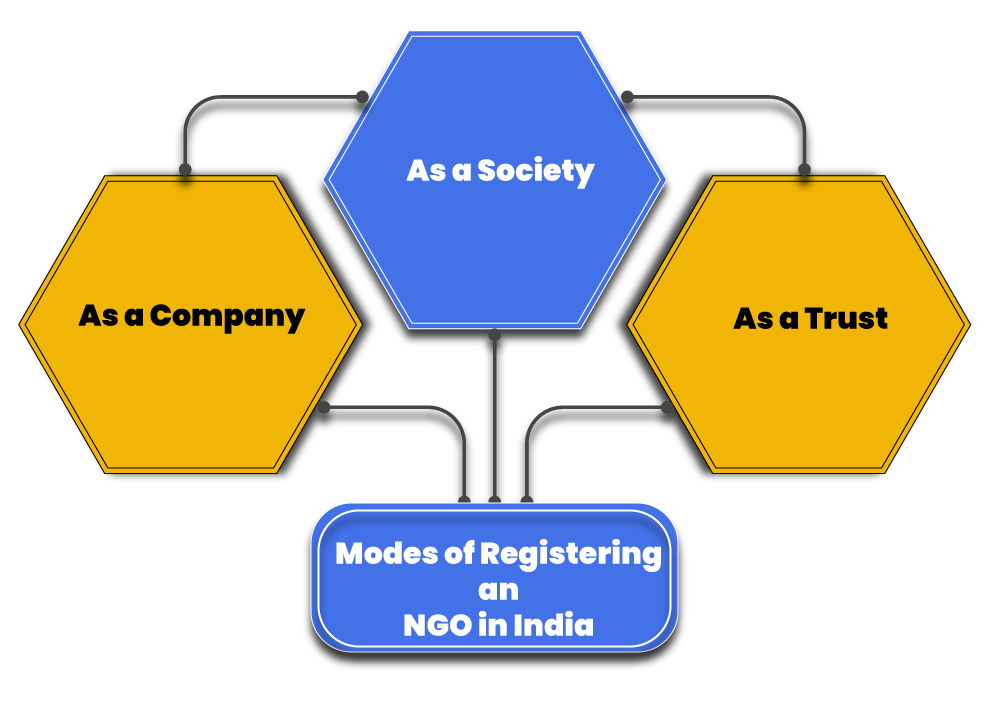
The different modes of NGO Registration in India are as follows:
- As a Society;
- As a Trust;
- As a Company;
As a Society
As per the provisions of the Societies Registration Act 1860, a minimum of 7 or more members are required to start an NGO as a society in India. Further, in this case, the name of the members must be mentioned in the MOA (Memorandum of Association) of the NGO.
Moreover, the main aim behind the formation of an NGO is to promote the agendas as follows:
- Charitable causes;
- Culture and Education;
- Public Welfare, etc.;
Also, an NGO needs to mandatorily work for the social welfare and cannot distribute the funds or the contribution received as dividend to its members.
As a Company
If in case an individual or a person wants to start an NGO in India for promoting non-profit purposes, such as follows, he/she needs to incorporate a Section 8 company under the provisions of the Companies Act 2013.
- Arts;
- Trade;
- Religion;
- Social Welfare;
- Science;
- Sports;
- Environmental Protection;
- Education;
- Research Purposes, etc.;
Further, after the completion of registration, the company needs to attach the term “limited” at the end of its name as a suffix. Also, it is mandatory for a section 8 company to specify the words, such as Foundation, Council, etc., in its name.
It shall be relevant to state that the income and profits of the company will be used only for the promotion of its goals.
As a Trust
A Trust is somehow the same as the concept of Section 8 Company and Society. Under this mode, the founder of the trust will only make the initial contribution and will have the authority to define the rules and regulations as well.
Further, the founder will have the authority to decide the mission and vision of the Trust. Also, it shall be taken into consideration that the mission and vision of the company must relate to the purposes as follows:
- Education;
- Eradication of Poverty;
- Medical Reliefs, etc.;
Moreover, to start an NGO as trust, a minimum of 2 people are required.
Examples of Non Government Organizations in India
Some of the famous and prominent examples of NGO in India are as follows:
- HelpAge India;
- CRY (Child Rights and You);
- Lepra Society;
- Smile Foundation;
- Rural Health Care Foundation;
- Goonj;
- Uddan Welfare Foundation;
- Deepalaya;
- Uday Foundation;
- Sounds of Silence;
- Bharti Foundation;
- Cure International India Trust;
- Goonj;
- Ipas Development Foundation;
- Make a Difference;
Documents Required for NGO Registration in India
The Documents required for NGO Registration in India are as follows:
Registration as a Society
The documents required for the Registration of an NGO as Society are as follows:
- Name of the Society;
- Address Proof of the Office;
- Residential Proof of all the members;
- Two copies of the Memorandum of Association;
- Two copies of the By Laws;
- A Letter of Request for the Registration of society under Law;
- Voter ID of all the Members;
- Driving License of all the Members;
- Affidavits of the Office Bearers;
- Aadhaar Card Number for all the Members;
- A Copy of Passport;
Registration as a Trust
The documents required for the Registration of an NGO as Trust are as follows:
- Details of the Trustees, such as follows:
- Name;
- Residential Address;
- Name of the Father;
- Age;
- Contact Number;
- Occupation;
- Email Address; and
- Two Latest Passport size Photographs;
- Utility Bill in the form of Electricity Bill or Water Bill conforming the address that would get registered;
- Voter ID proof;
- Aadhaar Card Number of the Members;
- Driving License;
- A copy of Passport;
Registration as a Section 8 Company
The documents required for the Registration of an NGO as a Section 8 Company Registration are as follows:
- Approval for the Company Name;
- Address of the Registered Office;
- Utility Bill in the form of a Water bill, Electricity bill or House Tax Receipt;
- Voter ID card of all the Directors;
- Driving License of all the Directors;
- Aadhaar Card Number for all the Directors;
- A copy of Passport for all the Directors;
- MOA (Memorandum of Association) and AOA (Articles of Association) of the Company;
Process to Start an NGO in India
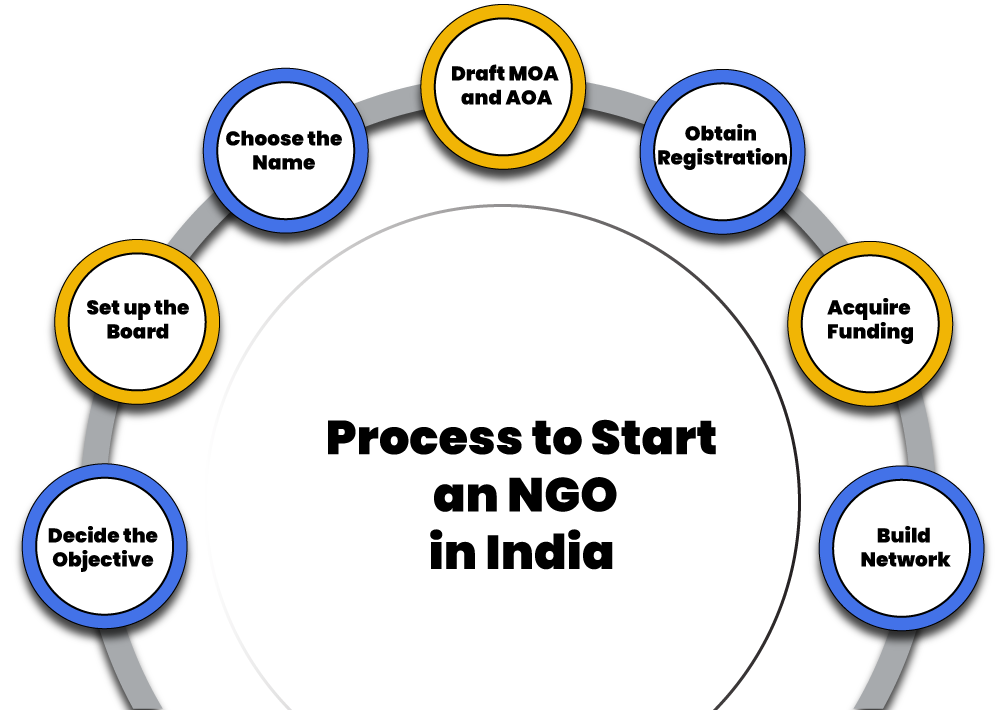
The steps involved in the process for NGO Registration in India are as follows:
Decide the Objective
The first and the foremost step in the process of Online NGO Registration is to decide its objective and Agenda. The term objective and agenda includes either or all of the following:
- Upliftment of Children Education;
- Women Empowerment;
- Eradication of Social Ills;
- Facilitation of Rehabilitation Support for Disables;
- Sustainable Development;
- Support to Widows;
- Support for Elderly People, etc.;
Set up the Board
Now, in the next step, the company needs to appoint directors, who will be responsible and accountable for operating and managing the affairs of the NGO. Further, there is no upper limit prescribed for the maximum number of members or supporters.
Choose the Name
One of the obvious requirements for an NGO Registration in India is to have a name. Further, the name chosen must be unique, catchy, and un-offensive in nature. It should also be not similar to any existing Government Authority, Ministry, Board, Registered Company, or NGO.
Draft MOA and AOA
Every NGO registered in India requires to have a document in the form of Trust Deed/ Memorandum of Understanding/ or By Laws. These documents must include the details and information as follows:
- Name;
- Address;
- Mission;
- Vision;
- Details of the Governing Members;
- Human Resource;
- Rules and Regulations;
- Staffing Information; and
- Administrative Laws and Procedure;
Further, it shall be relevant to note that the Memorandum of the NGO must be drafted and prepared in an acceptable manner, pattern, parameters and process that are needed for registration and other procedures.
Also, prior to the submission of application for NGO Registration in India, it is significant to mention that the term “By Laws” must represent the following:
- Rules;
- Regulations;
- Modes of Operation;
- Working Pattern;
- Area of Working;
- Responsibilities of the NGO; and
- Objectives of an NGO;
Obtain Registration
After the submission of the documents and the required fees, one can obtain NGO Registration under any of the following acts:
Societies Registration Act 1860
For obtaining Society Registration, a minimum of 7 members are required.
Indian Trusts Act 1882
For obtaining Trust Registration, at least 2 people are required as members. However, there is no upper limit prescribed for the maximum members.
Companies Act 2013
For obtaining Section 8 company registration, the members need to follow the provisions of the Companies Act 2013 and submit the particulars with the Registrar of Companies.
Acquire Funding
After successfully obtaining the NGO Registration in India, the members can raise funding through both Sources Internal and External Sources as follows:
Internal Sources
- Fees;
- Donations;
- Subscription Charges;
External Sources
- Grants;
- Aid from Government;
- Funding from Private Organizations;
- Funding from Foreign Sources;
Build Network
Lastly, the NGO registered needs to build a wide network by connecting to several other NGOs, Media Houses, Professionals, Corporate Houses, and Government Agencies.
Further, it should look out for Partnerships as well, as the main source for the survival of an NGO is majorly from Partnerships.
Thus, it is always suggested to associate and connect with potential partners who believe in the cause you support.
Conclusion
In a nutshell, the main reason behind the NGO Registration in India is to promote Social and Economic growth of the poverty-stricken and needy section of the country.
However, the process of registering an NGO in India is a back-breaking and tiring task. But at Swarit Advisors, our experts will cater all your needs regarding the process of registration and will make the hassle-free and straightforward for you. Further, our experts will provide you with the Certificate for section 12A and 80G.
Also, Read: How to Register an NGO Under Section 8 of Companies Act in India?














